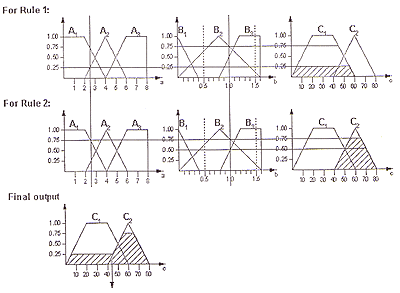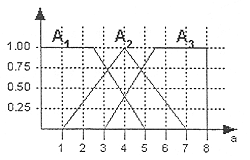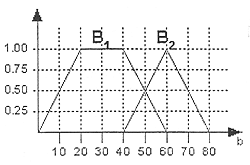| (a) | Given the fact that "I passed the exams" statements like "If I passed the exams, then I had sat for the exams" allow us to infer that "I had sat for the exams". However, a statement such as "If I can tall, then I am heavy" is, by itself, not particularly useful for inference. With reference to the two statements, explain why this is so. | [4] |
| In the former, the
elementary propositions, as well as the complete statement can either be true or false.
Therefore, if we know the value of the antecedent (or conclusion). In the latter, the elementary propositions do not have a crisp value. The terms 'tall' and 'heavy' are vague, there is no general accepted consensus of what 'tall' and 'heavy' is. A 'tall' person in Asia may only be considered as of average height in America.
|
||
| (b) | When a fuzzy set is shown in graphical form (see diagram in part C), the vertical axis represent the membership value for the fuzzy set. Explain what the membership value means. | [3] |
| A membership value of
0 means that a value x in the universe of discourse does not belong to the fuzzy set,
while a membership of 1 means that x belongs to the fuzzy set with 100% certainty. - A membership value between 0 and 1 (not inclusive) indicates the degree in which x belongs to the fuzzy set.
|
||
| (c) | When a fuzzy set diagram, fuzzy sets B and C
are the results of a dilation and concentration of A. (i) What do fuzzy hedges do? (ii) Given that A represents the fuzzy set short, identify a fuzzy hedge that describes fuzzy set C.
|
[1] [1] |
| (i) fuzzy hedges alter a sets range
|
||
| (ii) fuzzy hedges include 'very short' and 'extremely short' and other suitable terms
|
||
| (d) | Let An and Bn represent
fuzzy sets in the following graphs. Given that A2 ->B1 and a = 2.5, describe the steps in single inference which will allow you to find the value of b, Find the value of b.
|
[4] |
| 1. Fuzzyfication: find
the membership value of A2 : mA2 (2.5) = 0.5 2. Inference: find the output fuzzy set for the membership value for each rule where mB1(b) = 0.5 3. Defuzzification: from the output fuzzy set find the final output value subset of fuzzy set B1 where mB1(b) = 0.5, find the value of b. 4. So b = 30
|
||
| (e) | Let An, Bn and Cn
represent fuzzy sets in the following graphs. Given that:
Using the graphs provided in Appendix 1, show how you would obtain the output. Note : Students attempting this question must fill in Appendix 1, detach the appendix from the question booklet, and attach it to the Answer Booklet. |
|
 For each of the following: Rule 1: Fuzzy set A2 Final output
|


